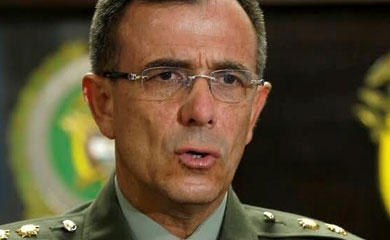Colombia closed its borders and imposed a liquor ban ahead of Sunday’s local elections.
The measures are standard procedure and supposedly meant to promote orderly elections after a disorderly and relatively violent three months of campaigning.
Standard measures after special campaign
The border with Venezuela was closed on Thursday already and the borders with Brazil and Ecuador closed on Saturday and will open again at 4PM on Sunday once polling stations close.
The liquor ban takes force on Saturday 6PM and will be lifted on Monday 6AM.

General Jorge Vargas.
The National Police deployed almost 70,000 troops to secure tranquil elections, according to General Jorge Vargas.
The military said it deployed an extra 55,000 men and women.
Unlike in previous years, the ELN did not announce a ceasefire, but the ELN and other illegal armed group are not expected to interfere with the election cycle, Vargas told press on Thursday.
The FARC, which was still in arms during the 2015 elections, will be taking part in the elections of 60 of the country’s 1,100 municipalities this year after a three-year peace process.
From bullet to ballot box – the FARC’s struggle towards political participation
Tense election day after relatively violent campaign
The participation of the former guerrillas, and the ambitions of relatively new parties to take on regional dynasties have created a particularly tense and relatively violent election cycle.
The demobilization of what used to be the country’s largest rebel group did not result in a significantly less politically violent election year, according to think tanks.
According to conflict monitor Cerac, the number of politically motivated killings dropped from 95 in the first nine month of 2015 to 91 this year.
Political killings
Source: Cerac
Risk of fraud and violence
 The independent Electoral Observation Mission (MOE) registered 108 acts of violence against candidates during the three months of formal campaigning.
The independent Electoral Observation Mission (MOE) registered 108 acts of violence against candidates during the three months of formal campaigning.
The majority of this violence took place in regions where the state failed to take over control after the FARC’s demobilization in 2017.
The MOE agreed with the police that no illegal armed group had the capacity to threaten the elections, but warned for risks of fraud and violence in 152 municipalities, particularly in the Pacific region and the north of Antioquia, the country’s second largest province.
The 2018 elections in which President Ivan Duque was elected were the most peaceful in decades. Whether Duque can maintain the trend remains to be seen. His government has been under immense criticism over the violence during the campaign.



